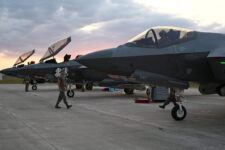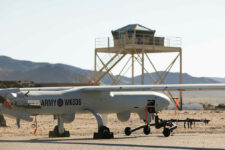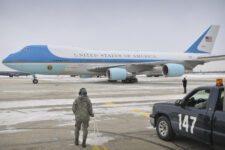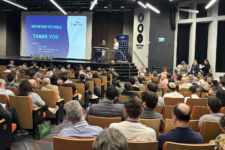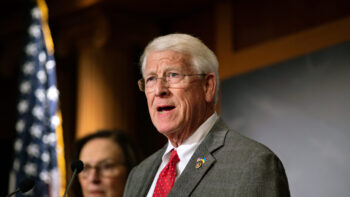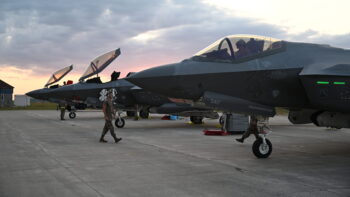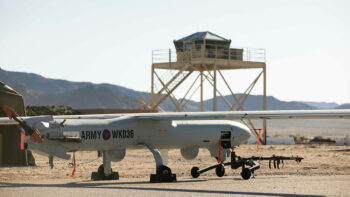
Sailors assigned to Assault Craft Unit 4 prepare material recovered in the Atlantic Ocean from a high-altitude balloon for transport to federal agents at Joint Expeditionary Base Little Creek Feb. 10, 2023. (U.S. Navy photo by Mass Communication Specialist 1st Class Ryan Seelbach)
When a Chinese surveillance balloon floated over the continental US, it became the biggest story in the world. It could have also been a much-needed chance at direct diplomacy between the world most powerful nation and its greatest rival, writes Robert Rust of the Union of Concerned Scientists — a chance the Biden administration wasted.
When Joe Biden took office in 2021, many analysts and watchers in both China and the United States expected at least a slight relaxation of the previous administration’s tough line on China. Halfway into Biden’s first term, such a relaxation has not been forthcoming, and tension is arguably higher than ever in the bilateral relationship.
Recently, the administration has fumbled the opportunity to diffuse this tension. It could have more firmly refuted claims by an Air Force general that the United States and China would be at war within two years, and it could have followed its downing of a Chinese “spy balloon” by pressing ahead with the Secretary of State’s visit to Beijing.
Instead, the trip has been indefinitely postponed, and the administration has forfeited a valuable opportunity for bilateral dialogue, particularly as the Pentagon and lawmakers express growing concern over China’s nuclear arsenal. Deprioritizing dialogue under these conditions is a crucial mistake.
Another Prediction Of Impending War
On Jan. 27, a memo circulated by Air Mobility Command General Mike Minihan caused a flurry of media attention and provoked high-level response on the Hill. “My gut tells me [the US and China] will fight in 2025,” the memo begins, arguing that the coinciding US and Taiwanese elections and China’s recent military build-up offer President Xi Jinping a perfect opportunity to strike Taiwan.
Minihan’s comments are the latest in a trend of increasingly incendiary language on China from US military officials, which often hinges on exaggerations and misrepresentations of the key factors impacting the bilateral relationship. But war with China is not inevitable. Military figures treating a US-China war as such are especially dangerous, as it heightens the strain on the relationship between Beijing and Taipei, and puts Taiwan at increased risk.
While the Pentagon quickly clarified that Minihan’s comments are not reflective of DoD policy on China, others, like former Secretary of State Mike Pompeo and chair of the House Foreign Affairs Committee Rep. Michael McCaul, R-Texas, expressed agreement with his prognosis.
Predictions of a war with China have long focused on Taiwan’s status as a powder keg awaiting an inevitable spark. In 2004, the Cato Institute’s Ted Galen Carpenter wrote a book arguing that a US-China war over the island within five to ten years was “virtually inevitable.” Since 2012, Graham T. Allison’s “Thucydides Trap” theory popularized the idea that the future of US-China relations is likely to be determined by a supposed historical destiny of conflict between rising powers and sitting hegemons.
Theories and debates among scholars and analysts, however, differ from high-ranking officers explicitly predicting war within a handful of years. In his 2021 testimony to the Senate Armed Services Committee, retiring Indo-Pacific Combatant Commander Admiral Phil Davidson estimated that China may try to retake control of Taiwan within the next six to 10 years. This timeframe has since been referred to as the “Davidson Window.” This past October, Chief of Naval Operations Mike Gilday suggested that a military conflict could occur as soon as this year.
Both Chinese and American experts have expressed concern over the increasingly bellicose rhetoric, while simultaneously arguing against the imminence of war. Speaking to The Washington Post, Zhu Feng, Executive Dean of the Institute for International Studies at Nanjing University, argued that China’s People’s Liberation Army is ill-prepared for an invasion, and that Beijing is reluctant to put itself in a similarly hostile international environment to Russia.
Despite holding a more pessimistic long-term outlook, former Assistant Secretary of State for Intelligence and Research Carl Ford argued last year that there is currently no “reason” Beijing would invade Taiwan. Like Zhu, Ford pointed to international reactions and the difficulty of an amphibious invasion. The Washington Post also cited retired Taiwanese professor Lin Chong-Pin, who emphasized that Xi Jinping feels he has “time to wait,” as evidenced by the popular Chinese belief that the East is ascending while the West is in gradual decline. Ex-Navy admiral and former NATO Supreme Allied Commander James Stavridis theorized that Xi would exercise increased caution in the wake of Russia’s “debacle” in Ukraine, decreasing the chance of war in the short term.
All these views generally accord with the Pentagon’s 2022 China Military Power Report (CMPR) [PDF], which acknowledges increased Chinese military posturing towards Taiwan but sees potential reunification as a longer-term goal.
A Punctured Dialogue
Bridging this gap in communication and understanding between the United States and China is crucial. Earlier this month, the Biden administration chose to forego an opportunity to do just that.
On Feb. 2, the Pentagon revealed that a Chinese “surveillance” balloon was floating over the continental United States. Two days later the balloon was shot down off the coast of South Carolina.
While it was in the air, however, the balloon garnered international headlines and derailed a much-anticipated visit to China by US Secretary of State Antony Blinken, who was scheduled to depart on Feb. 3. In nixing the trip, Blinken said the “conditions were not conducive for a constructive visit at this time.”
This postponement was a mistake. Despite some officials and analysts downplaying the importance or danger of China’s balloon to American interests, the administration seemed to be preoccupied by the optics of a visit while such an incident was unfolding in US airspace. Beijing is not blameless, as the US military says China rebuffed efforts to communicate in the aftermath of the balloon incident.
A lot is at stake, not just for the US and China, but for the entire international community. Both sides should do their utmost to engage sincerely in finding solutions to controversies, whether that means taking a phone call or boarding a plane.
From the U.S. perspective, the likelihood of gaining clarity on the balloon situation is much higher with an in-person meeting. With recent reports suggesting the balloon may never have been intended to enter U.S. airspace, it is obvious that there are still twists remaining in this saga.
Balloons aside, when Blinken’s trip hopefully goes ahead in the near future, opening a dialogue on nuclear weapons will likely be a key objective of the visit. That’s a difficult topic for the two sides to see eye-to-eye on, and predictions of an impending war will not make it any easier.
Perhaps a positive side of the balloon saga is that Minihan’s prediction of war is not at the forefront of everyone’s minds once the visit, hopefully, takes place. Perhaps a visit will give the American delegation a chance to firmly refute those comments. Hawkish and dramatic exaggerations from the military bring unnecessary tension to a crucially important bilateral relationship, which faces enough problems as it is.
If powerful American military figures continue to publicly describe a US-China war as inevitable, they run the risk of turning it into a self-fulfilling prophecy. Such a conflict is not inevitable, and predictions to that effect have been proven wrong before. Meanwhile, top lawmakers like McCaul have a responsibility to steer clear of incendiary rhetoric that does nothing but raise tensions.
Acting like the United States’ relationship with China is beyond repair hurts American security interests most of all. Saber-rattling over Taiwan also directly affects 23 million people, a significant majority of whom continue to express a preference for the status quo in Taiwan’s relationship with the mainland. Their welfare should not be put on the line when there are still ample opportunities for improvement of the bilateral relationship between the US and China.
Moreover, when those opportunities present themselves, the Biden administration should do all it can to take full advantage of them, and not leave them to float on by.
Robert Rust is a China analyst with the Union of Concerned Scientists. He holds a Master of Arts in Chinese Society and Culture from the University of Oslo, and previously worked at the Royal Norwegian Embassy in Beijing.
